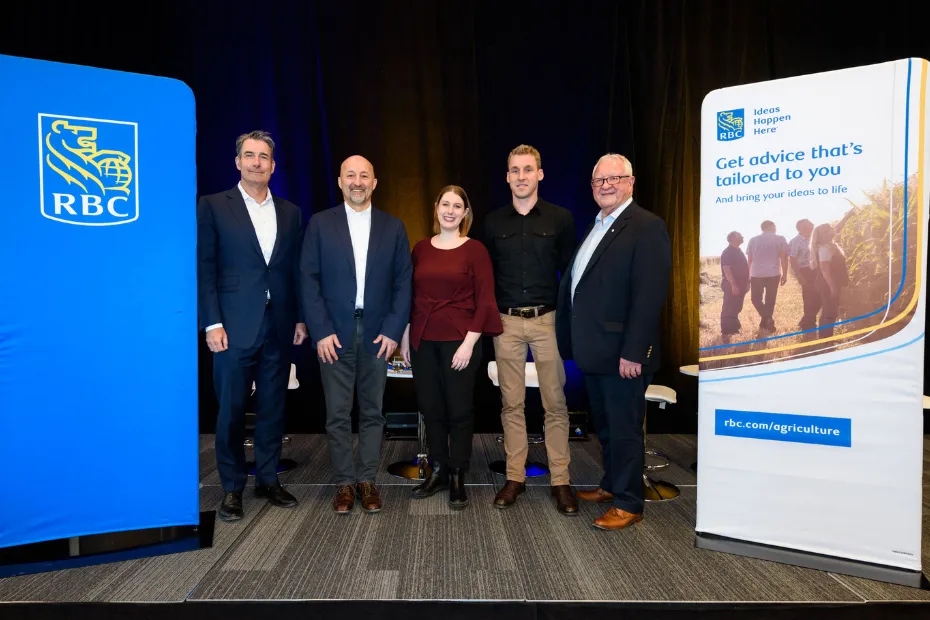The Next Green Revolution in Winnipeg, Man.: Why leveraging the expertise of farmers is critical to achieving sustainable agriculture

Published August 16, 2023 • 7 Min Read
“The [phrase agricultural sustainability] comes up, if you’re at a farm meeting, and most farmers kind of roll their eyes and probably turn off their brains for the next 20 minutes, because we’ve gotten really tired of other people telling us what to do,” Nicolea Dow, a third generation farmer and Manitoba Canola Growers Board Member, noted. “It’s critical, right now, that farmers are elevated as experts… we haven’t had a voice in the spaces that we’ve needed to.”
This kind of inclusion in policymaking was the main theme Nicolea and her fellow panelists discussed as part of RBC’s recent The Next Green Revolution event in Winnipeg, Man. In addition to Nicolea, the panel included:
-
John Heimbecker, CEO Parrish & Heimbecker, Limited (P&H)
-
Dr. Nazim Cicek, Associate Dean Research, Faculty of Agriculture and Food Sciences, University of Manitoba
The consensus was there’s a disconnect between what farmers think about sustainable agriculture and the way policymakers go about developing legislation to help farms get to net zero.
For starters, farmers – as long-time stewards of the land – often know what’s best. They have boots on the ground – which is something most policymakers don’t have.
“We’ve been farming Manitoba, since I think 1870/1880, [policymakers] have to trust that the people whose very livelihood has depended on the notion of [sustainable agriculture], will always have the interest of sustainable agriculture [at the core of what they do]… otherwise, they’ll have nothing,” John said.
Harwin agreed and it’s never that farmers don’t want to have conversations about sustainable agriculture with government officials – the eye rolls come when farmers are talked at versus being engaged with and when what’s being discussed feels reactive versus proactive.
“We think about what’s best for the next generation as we farm a piece of dirt… [we have to think] that way [when it comes to developing policies] in response to new pressures and to [adapt to them] slowly and do it right,” he said. “There will be lots [of] ideas… coming up in the next few years… and [we just want the message] to get through to the government that we’re going to do this… we want to be [more environmentally conscious]. We always have been.”
For John, this lack of foresight and need to reach net-zero quickly has already resulted in a number of questionable decisions from Ottawa.
“I really think we need to slow this whole [sustainable agriculture] thing down,” John noted. “I think that eastern policy has leaped far ahead of what’s pragmatic and what’s practical for Canada, and that’s not to say we don’t need to be making improvements, but I do think that the policy, perhaps in an effort [for us to] be a leader in the world… has far surpassed what it is we’re able to do.”
He added he has yet to see – on a global level – anyone farm better than western Canadian farmers do and that most of the ecological improvements that have been made happened without the need of any government policy whatsoever.
For example, he noted, farmers have worked with their suppliers to improve the intensification of farming, “which should tell all of us quite a lot about what the role of government policy is relative to the way a farmer wants to take care of [their] land in an intentional way.”
Nazim added one of the other challenges is that farmers are often responsible for translating research and policies related to sustainable agriculture into practices they can use on their fields; policymakers and commodity groups should be helping here.
“There’s lots of opportunity if it’s done right and if it’s translated into action on the landscape,” Nazim noted. “Taking [research] and having the producers use it – that’s where the challenge is… knowledge is not the limiting factor… it’s incentives that drive change that holds us back… it goes back to policy.”
Another very real concern among the panelists was that it can be too easy for policymakers to see certain data and figures and to develop agri-policy without focusing on the number one thing that farmers do (and should do) best: grow food.
“We can talk about biofuel and all of these things, but really, the core of agriculture is producing food, and that’s a real intrinsic value that we can’t lose sight of,” Nicolea said. “We’re now living in a time… [that we’re realizing how important] food is not just for human life, but for peace and stability in the world. And so, these conversations have to come back to that. It would be unacceptable to have any solution that would take away from the food that we can produce, especially in a country like Canada.”
This is where Harwin’s discussion around Kroeker Farms’ decision to produce both organic and conventional crops was especially pertinent. He said that while the technology used to farm organically may lessen the load on the environment, it’s not yet a sustainable production model for farmers to do regularly.
For starters, it’s not financially viable to grow everything under an organic regime. “You always have to ask ‘is there a consumer who’s willing to pay for it?’ and right now, there’s a small subset of the population that is… they’re usually wealthy enough and eco-conscious enough to afford these kinds of products because they cost more,” he noted. “It’s not a product that’s necessarily recession-proof and that’s going to be a challenge.”
It’s also not maintainable in terms of output. On his farm, with organics, the rotation often requires a green manure nutrition crop one in three years – meaning food is produced two out of three years – and at a reduced yield as compared to conventional production. “So now we’ve reduced the amount of food produced per acre… are you going to feed the world on 55 per cent [yield] compared to conventional systems? No, you’re not… so are you going to take up more land and turn it into farmland? That’s also not something that’s good especially not in the context of greenhouse gases.”
This is why, the panel noted, it’s critical to involve farmers in conversations about sustainable agriculture – whether they focus on setting targets about reducing fertilizer emissions by 2030, overcoming some of the technological barriers that rural farming presents, or how to effectively measure organic matter in the soil.
“I think farmers are feeling really frustrated because we have this thrown at us. We haven’t been told how we’re going to do it. We haven’t been told these practices move the needle this much. And if you don’t understand the impact of something, how can you really change it?” Nicolea said. “So, I think taking advantage of farmers as experts… and to make opportunities for farmers to be able to have conversations with each other and government officials… it’s an old school [solution], but it’s really important.”
To learn more about RBC’s recent report The Next Green Revolution, click here.
You can also hear what agriculture industry experts and farmers at our other events had to say about the future of farming when it comes to sustainable agriculture.
While information presented is believed to be factual and current, its accuracy is not guaranteed and it should not be regarded as a complete analysis of the subject matter discussed. All expressions of opinion reflect the judgment of the author(s) as of the date of publication and are subject to change. No endorsement of any third parties or their advice, opinions, information, products or services is expressly given or implied by Royal Bank of Canada or its affiliates.
This article is intended as general information only and is not to be relied upon as constituting legal, financial or other professional advice. A professional advisor should be consulted regarding your specific situation. Information presented is believed to be factual and up-to-date but we do not guarantee its accuracy and it should not be regarded as a complete analysis of the subjects discussed. All expressions of opinion reflect the judgment of the authors as of the date of publication and are subject to change. No endorsement of any third parties or their advice, opinions, information, products or services is expressly given or implied by Royal Bank of Canada or any of its affiliates.
Any information, opinions or views provided in this document, including hyperlinks to the RBC Direct Investing Inc. website or the websites of its affiliates or third parties, are for your general information only, and are not intended to provide legal, investment, financial, accounting, tax or other professional advice. While information presented is believed to be factual and current, its accuracy is not guaranteed and it should not be regarded as a complete analysis of the subjects discussed. All expressions of opinion reflect the judgment of the author(s) as of the date of publication and are subject to change. No endorsement of any third parties or their advice, opinions, information, products or services is expressly given or implied by RBC Direct Investing Inc. or its affiliates. You should consult with your advisor before taking any action based upon the information contained in this document.
Furthermore, the products, services and securities referred to in this publication are only available in Canada and other jurisdictions where they may be legally offered for sale. Information available on the RBC Direct Investing website is intended for access by residents of Canada only, and should not be accessed from any jurisdiction outside Canada.
Share This Article





